Hospitality Business Toolkit: Financial, HR, Legal, and Performance
VerifiedAdded on 2023/01/11
|14
|3333
|79
Report
AI Summary
This report delves into the operational and managerial aspects of the hospitality industry, using InterContinental Hotels as a case study. It begins with an introduction to the industry, followed by an analysis of financial performance, including principles of financial management, the double-entry bookkeeping system, and the creation of a basic trial balance. The report then explores the human resource life cycle, examining its various stages and the application of a performance management plan within a hospitality context. Furthermore, the report addresses relevant legislations and the impact of employment and contract law on business decision-making. It includes ratio calculations to analyze financial data and concludes with an overview of the key findings. This report provides a comprehensive understanding of the tools and processes used to manage and optimize a hospitality business.
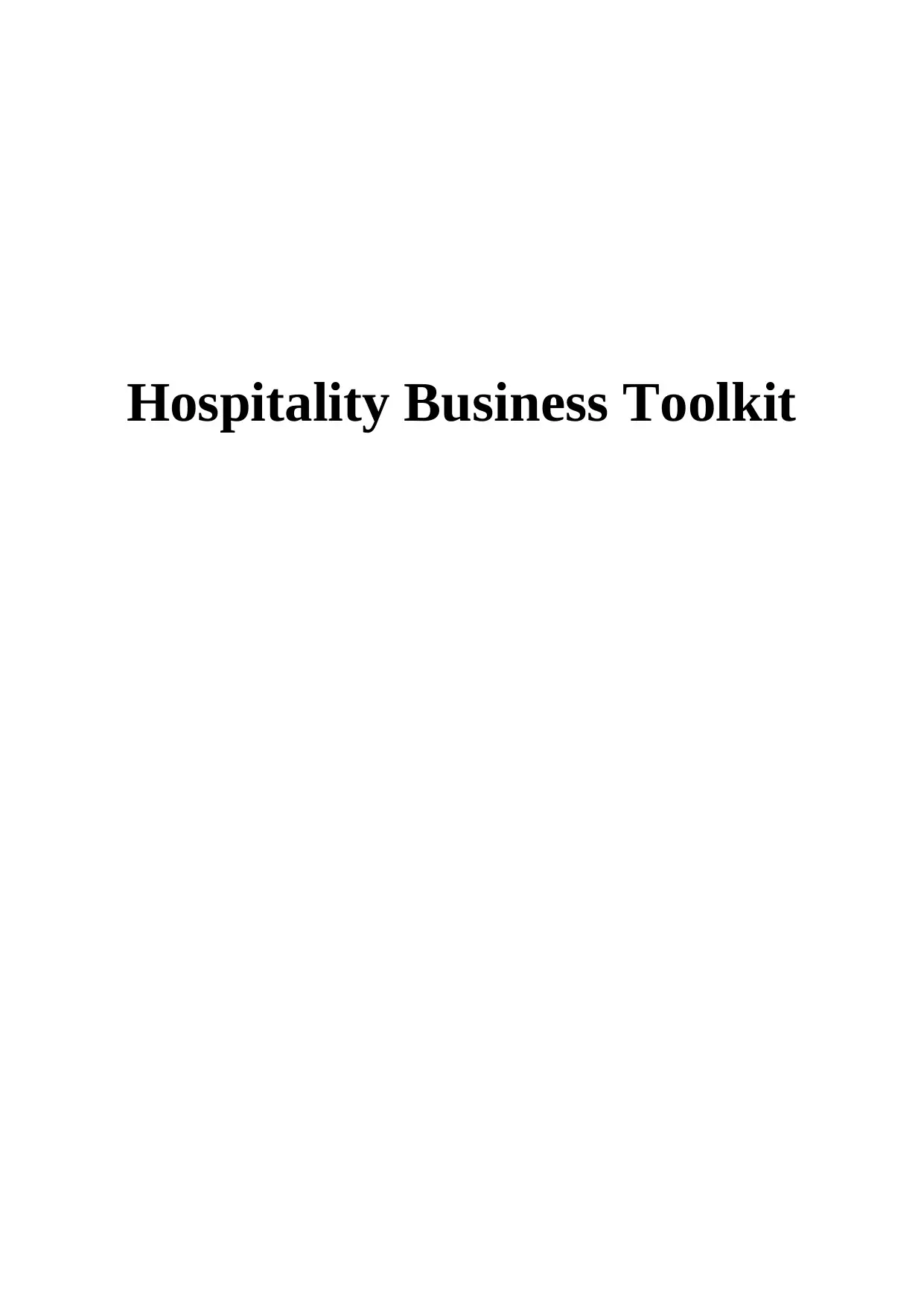
Hospitality Business Toolkit
Paraphrase This Document
Need a fresh take? Get an instant paraphrase of this document with our AI Paraphraser
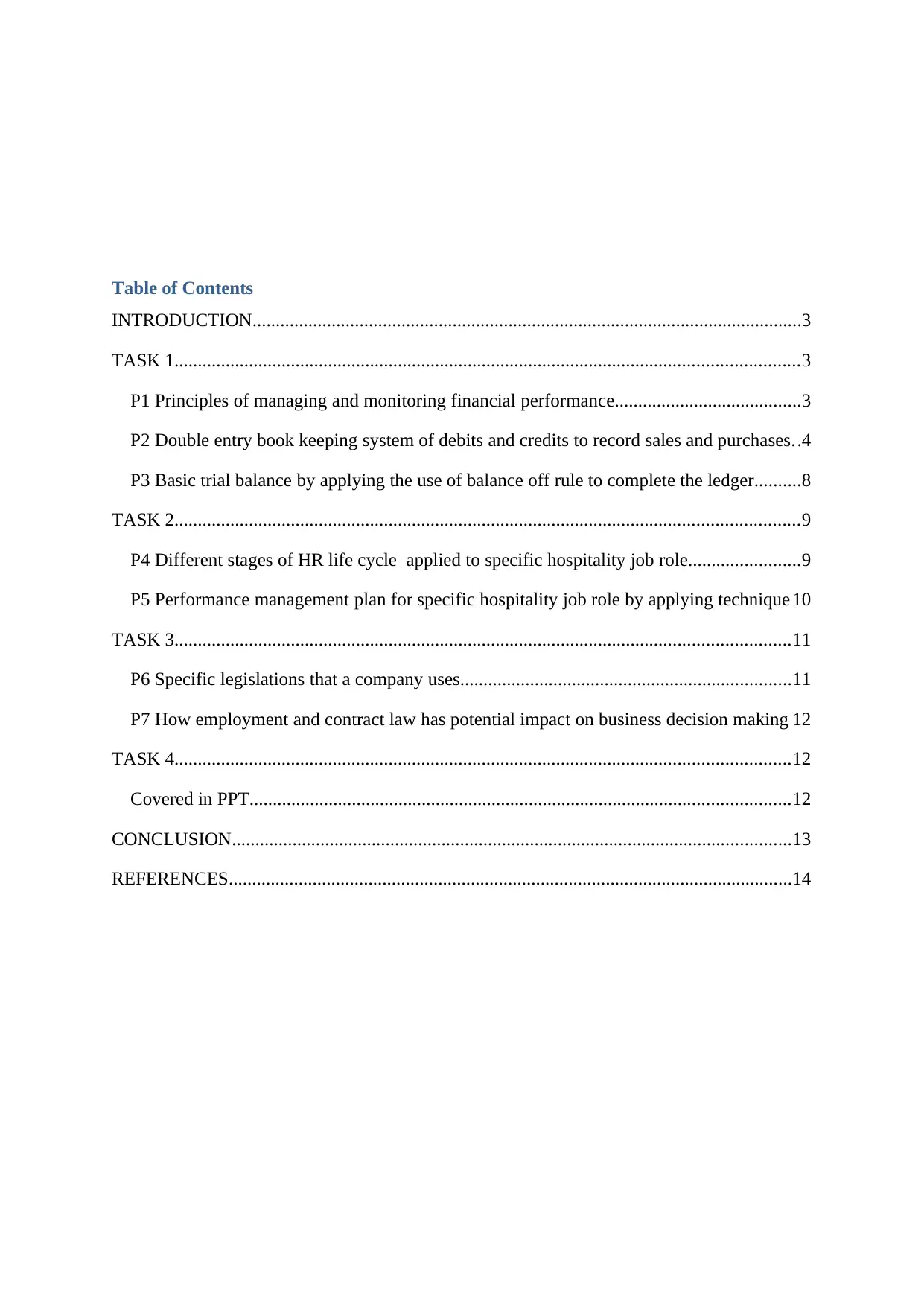
Table of Contents
INTRODUCTION......................................................................................................................3
TASK 1......................................................................................................................................3
P1 Principles of managing and monitoring financial performance........................................3
P2 Double entry book keeping system of debits and credits to record sales and purchases..4
P3 Basic trial balance by applying the use of balance off rule to complete the ledger..........8
TASK 2......................................................................................................................................9
P4 Different stages of HR life cycle applied to specific hospitality job role........................9
P5 Performance management plan for specific hospitality job role by applying technique 10
TASK 3....................................................................................................................................11
P6 Specific legislations that a company uses.......................................................................11
P7 How employment and contract law has potential impact on business decision making 12
TASK 4....................................................................................................................................12
Covered in PPT....................................................................................................................12
CONCLUSION........................................................................................................................13
REFERENCES.........................................................................................................................14
INTRODUCTION......................................................................................................................3
TASK 1......................................................................................................................................3
P1 Principles of managing and monitoring financial performance........................................3
P2 Double entry book keeping system of debits and credits to record sales and purchases..4
P3 Basic trial balance by applying the use of balance off rule to complete the ledger..........8
TASK 2......................................................................................................................................9
P4 Different stages of HR life cycle applied to specific hospitality job role........................9
P5 Performance management plan for specific hospitality job role by applying technique 10
TASK 3....................................................................................................................................11
P6 Specific legislations that a company uses.......................................................................11
P7 How employment and contract law has potential impact on business decision making 12
TASK 4....................................................................................................................................12
Covered in PPT....................................................................................................................12
CONCLUSION........................................................................................................................13
REFERENCES.........................................................................................................................14
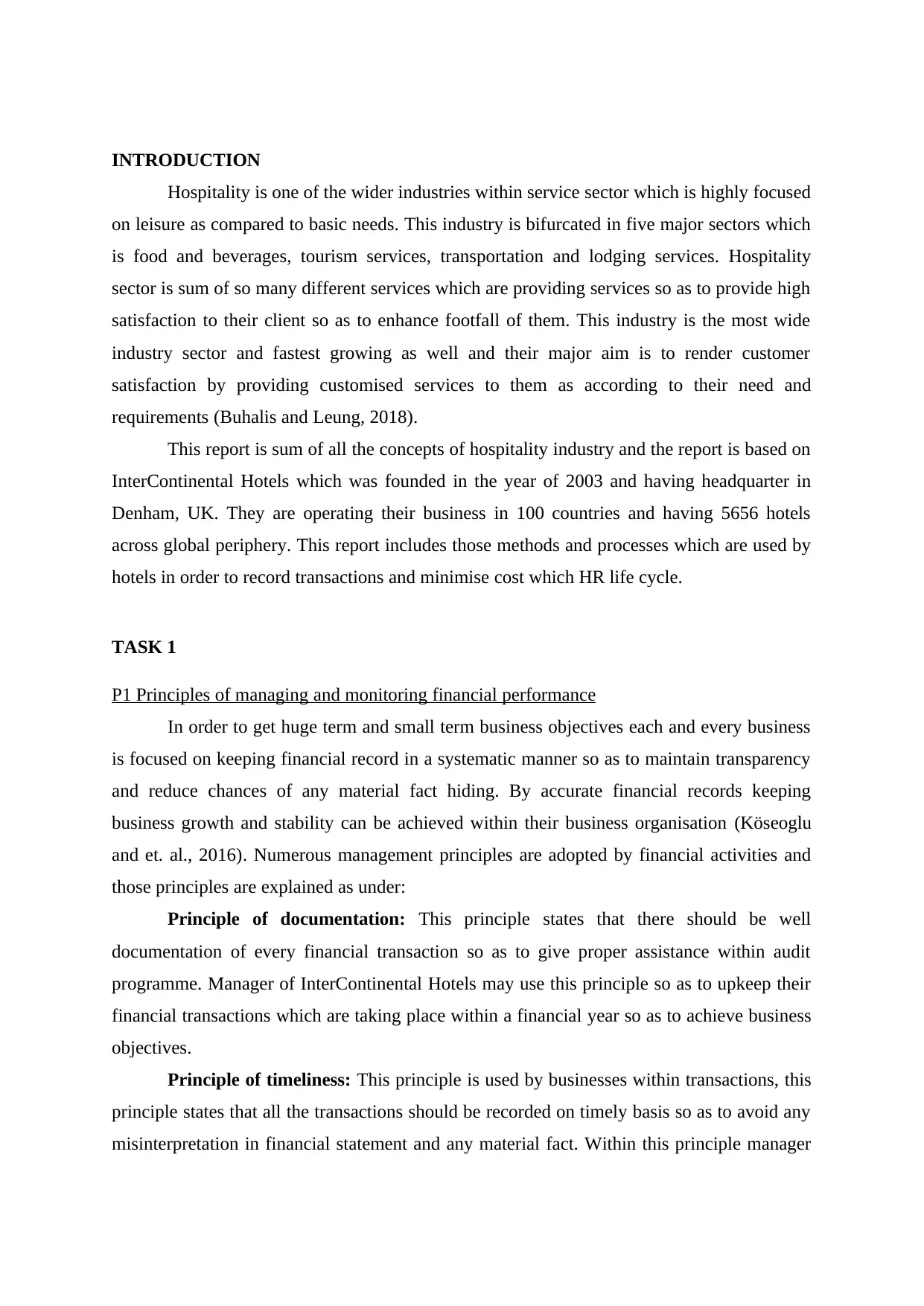
INTRODUCTION
Hospitality is one of the wider industries within service sector which is highly focused
on leisure as compared to basic needs. This industry is bifurcated in five major sectors which
is food and beverages, tourism services, transportation and lodging services. Hospitality
sector is sum of so many different services which are providing services so as to provide high
satisfaction to their client so as to enhance footfall of them. This industry is the most wide
industry sector and fastest growing as well and their major aim is to render customer
satisfaction by providing customised services to them as according to their need and
requirements (Buhalis and Leung, 2018).
This report is sum of all the concepts of hospitality industry and the report is based on
InterContinental Hotels which was founded in the year of 2003 and having headquarter in
Denham, UK. They are operating their business in 100 countries and having 5656 hotels
across global periphery. This report includes those methods and processes which are used by
hotels in order to record transactions and minimise cost which HR life cycle.
TASK 1
P1 Principles of managing and monitoring financial performance
In order to get huge term and small term business objectives each and every business
is focused on keeping financial record in a systematic manner so as to maintain transparency
and reduce chances of any material fact hiding. By accurate financial records keeping
business growth and stability can be achieved within their business organisation (Köseoglu
and et. al., 2016). Numerous management principles are adopted by financial activities and
those principles are explained as under:
Principle of documentation: This principle states that there should be well
documentation of every financial transaction so as to give proper assistance within audit
programme. Manager of InterContinental Hotels may use this principle so as to upkeep their
financial transactions which are taking place within a financial year so as to achieve business
objectives.
Principle of timeliness: This principle is used by businesses within transactions, this
principle states that all the transactions should be recorded on timely basis so as to avoid any
misinterpretation in financial statement and any material fact. Within this principle manager
Hospitality is one of the wider industries within service sector which is highly focused
on leisure as compared to basic needs. This industry is bifurcated in five major sectors which
is food and beverages, tourism services, transportation and lodging services. Hospitality
sector is sum of so many different services which are providing services so as to provide high
satisfaction to their client so as to enhance footfall of them. This industry is the most wide
industry sector and fastest growing as well and their major aim is to render customer
satisfaction by providing customised services to them as according to their need and
requirements (Buhalis and Leung, 2018).
This report is sum of all the concepts of hospitality industry and the report is based on
InterContinental Hotels which was founded in the year of 2003 and having headquarter in
Denham, UK. They are operating their business in 100 countries and having 5656 hotels
across global periphery. This report includes those methods and processes which are used by
hotels in order to record transactions and minimise cost which HR life cycle.
TASK 1
P1 Principles of managing and monitoring financial performance
In order to get huge term and small term business objectives each and every business
is focused on keeping financial record in a systematic manner so as to maintain transparency
and reduce chances of any material fact hiding. By accurate financial records keeping
business growth and stability can be achieved within their business organisation (Köseoglu
and et. al., 2016). Numerous management principles are adopted by financial activities and
those principles are explained as under:
Principle of documentation: This principle states that there should be well
documentation of every financial transaction so as to give proper assistance within audit
programme. Manager of InterContinental Hotels may use this principle so as to upkeep their
financial transactions which are taking place within a financial year so as to achieve business
objectives.
Principle of timeliness: This principle is used by businesses within transactions, this
principle states that all the transactions should be recorded on timely basis so as to avoid any
misinterpretation in financial statement and any material fact. Within this principle manager
⊘ This is a preview!⊘
Do you want full access?
Subscribe today to unlock all pages.

Trusted by 1+ million students worldwide
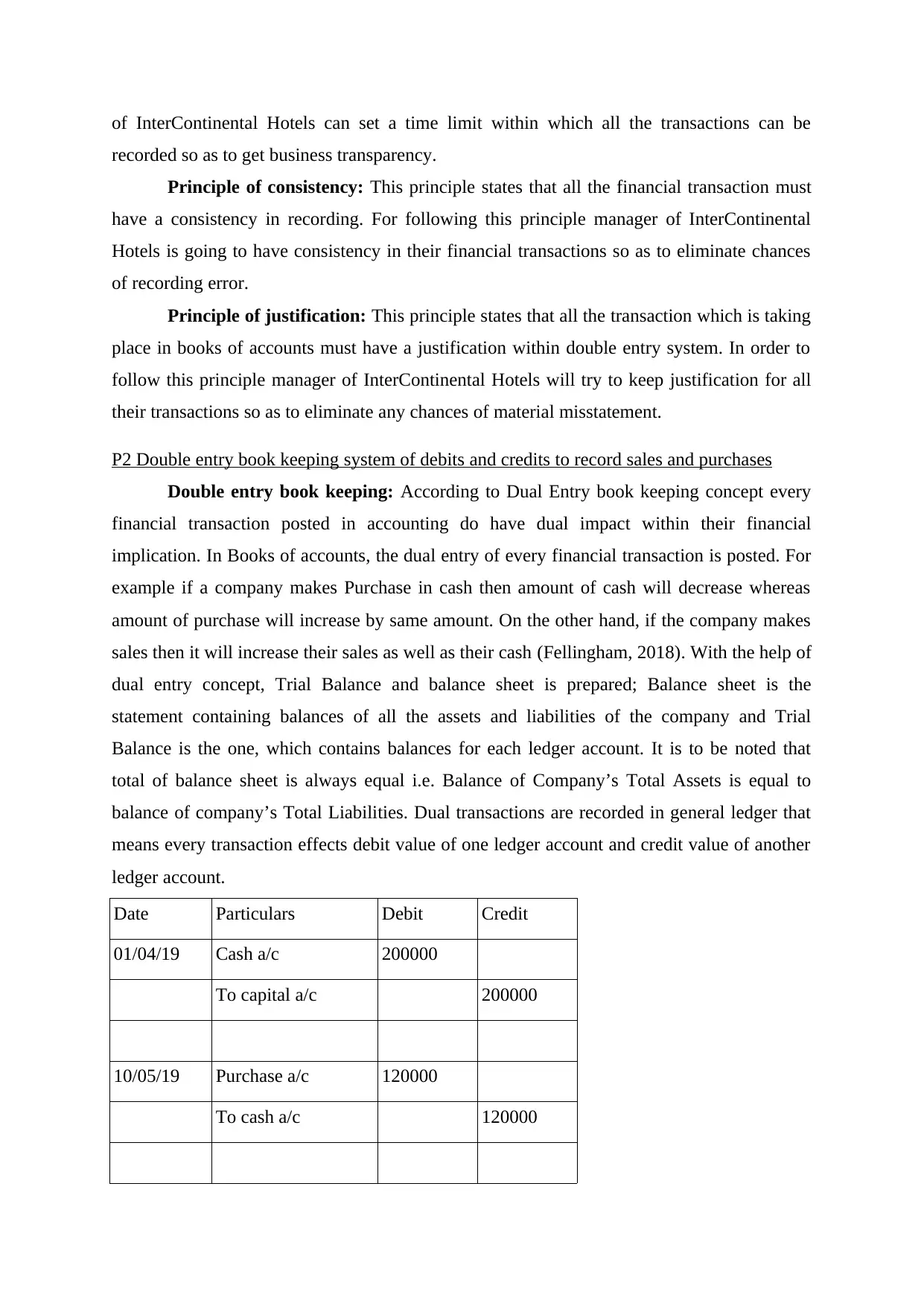
of InterContinental Hotels can set a time limit within which all the transactions can be
recorded so as to get business transparency.
Principle of consistency: This principle states that all the financial transaction must
have a consistency in recording. For following this principle manager of InterContinental
Hotels is going to have consistency in their financial transactions so as to eliminate chances
of recording error.
Principle of justification: This principle states that all the transaction which is taking
place in books of accounts must have a justification within double entry system. In order to
follow this principle manager of InterContinental Hotels will try to keep justification for all
their transactions so as to eliminate any chances of material misstatement.
P2 Double entry book keeping system of debits and credits to record sales and purchases
Double entry book keeping: According to Dual Entry book keeping concept every
financial transaction posted in accounting do have dual impact within their financial
implication. In Books of accounts, the dual entry of every financial transaction is posted. For
example if a company makes Purchase in cash then amount of cash will decrease whereas
amount of purchase will increase by same amount. On the other hand, if the company makes
sales then it will increase their sales as well as their cash (Fellingham, 2018). With the help of
dual entry concept, Trial Balance and balance sheet is prepared; Balance sheet is the
statement containing balances of all the assets and liabilities of the company and Trial
Balance is the one, which contains balances for each ledger account. It is to be noted that
total of balance sheet is always equal i.e. Balance of Company’s Total Assets is equal to
balance of company’s Total Liabilities. Dual transactions are recorded in general ledger that
means every transaction effects debit value of one ledger account and credit value of another
ledger account.
Date Particulars Debit Credit
01/04/19 Cash a/c 200000
To capital a/c 200000
10/05/19 Purchase a/c 120000
To cash a/c 120000
recorded so as to get business transparency.
Principle of consistency: This principle states that all the financial transaction must
have a consistency in recording. For following this principle manager of InterContinental
Hotels is going to have consistency in their financial transactions so as to eliminate chances
of recording error.
Principle of justification: This principle states that all the transaction which is taking
place in books of accounts must have a justification within double entry system. In order to
follow this principle manager of InterContinental Hotels will try to keep justification for all
their transactions so as to eliminate any chances of material misstatement.
P2 Double entry book keeping system of debits and credits to record sales and purchases
Double entry book keeping: According to Dual Entry book keeping concept every
financial transaction posted in accounting do have dual impact within their financial
implication. In Books of accounts, the dual entry of every financial transaction is posted. For
example if a company makes Purchase in cash then amount of cash will decrease whereas
amount of purchase will increase by same amount. On the other hand, if the company makes
sales then it will increase their sales as well as their cash (Fellingham, 2018). With the help of
dual entry concept, Trial Balance and balance sheet is prepared; Balance sheet is the
statement containing balances of all the assets and liabilities of the company and Trial
Balance is the one, which contains balances for each ledger account. It is to be noted that
total of balance sheet is always equal i.e. Balance of Company’s Total Assets is equal to
balance of company’s Total Liabilities. Dual transactions are recorded in general ledger that
means every transaction effects debit value of one ledger account and credit value of another
ledger account.
Date Particulars Debit Credit
01/04/19 Cash a/c 200000
To capital a/c 200000
10/05/19 Purchase a/c 120000
To cash a/c 120000
Paraphrase This Document
Need a fresh take? Get an instant paraphrase of this document with our AI Paraphraser
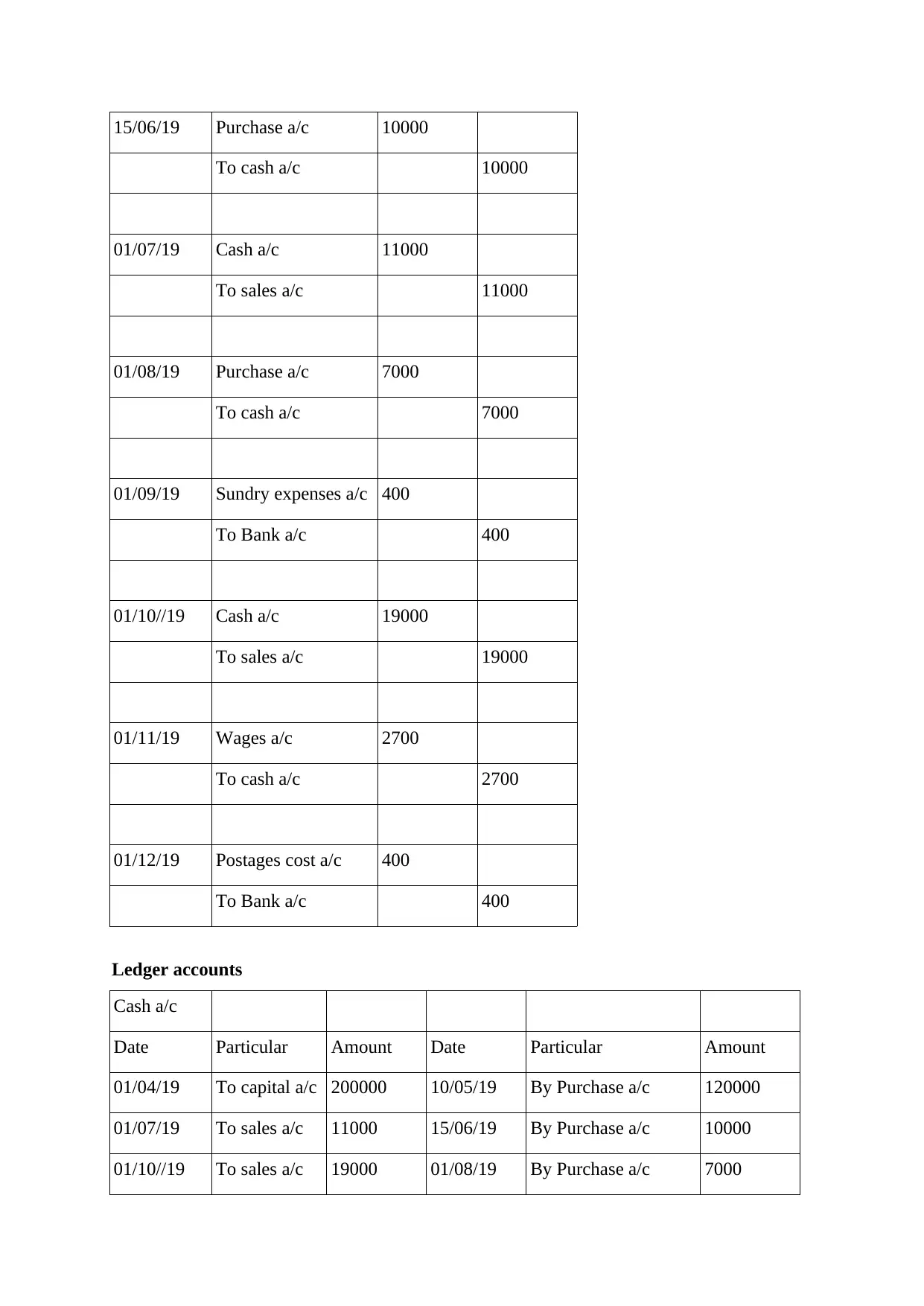
15/06/19 Purchase a/c 10000
To cash a/c 10000
01/07/19 Cash a/c 11000
To sales a/c 11000
01/08/19 Purchase a/c 7000
To cash a/c 7000
01/09/19 Sundry expenses a/c 400
To Bank a/c 400
01/10//19 Cash a/c 19000
To sales a/c 19000
01/11/19 Wages a/c 2700
To cash a/c 2700
01/12/19 Postages cost a/c 400
To Bank a/c 400
Ledger accounts
Cash a/c
Date Particular Amount Date Particular Amount
01/04/19 To capital a/c 200000 10/05/19 By Purchase a/c 120000
01/07/19 To sales a/c 11000 15/06/19 By Purchase a/c 10000
01/10//19 To sales a/c 19000 01/08/19 By Purchase a/c 7000
To cash a/c 10000
01/07/19 Cash a/c 11000
To sales a/c 11000
01/08/19 Purchase a/c 7000
To cash a/c 7000
01/09/19 Sundry expenses a/c 400
To Bank a/c 400
01/10//19 Cash a/c 19000
To sales a/c 19000
01/11/19 Wages a/c 2700
To cash a/c 2700
01/12/19 Postages cost a/c 400
To Bank a/c 400
Ledger accounts
Cash a/c
Date Particular Amount Date Particular Amount
01/04/19 To capital a/c 200000 10/05/19 By Purchase a/c 120000
01/07/19 To sales a/c 11000 15/06/19 By Purchase a/c 10000
01/10//19 To sales a/c 19000 01/08/19 By Purchase a/c 7000
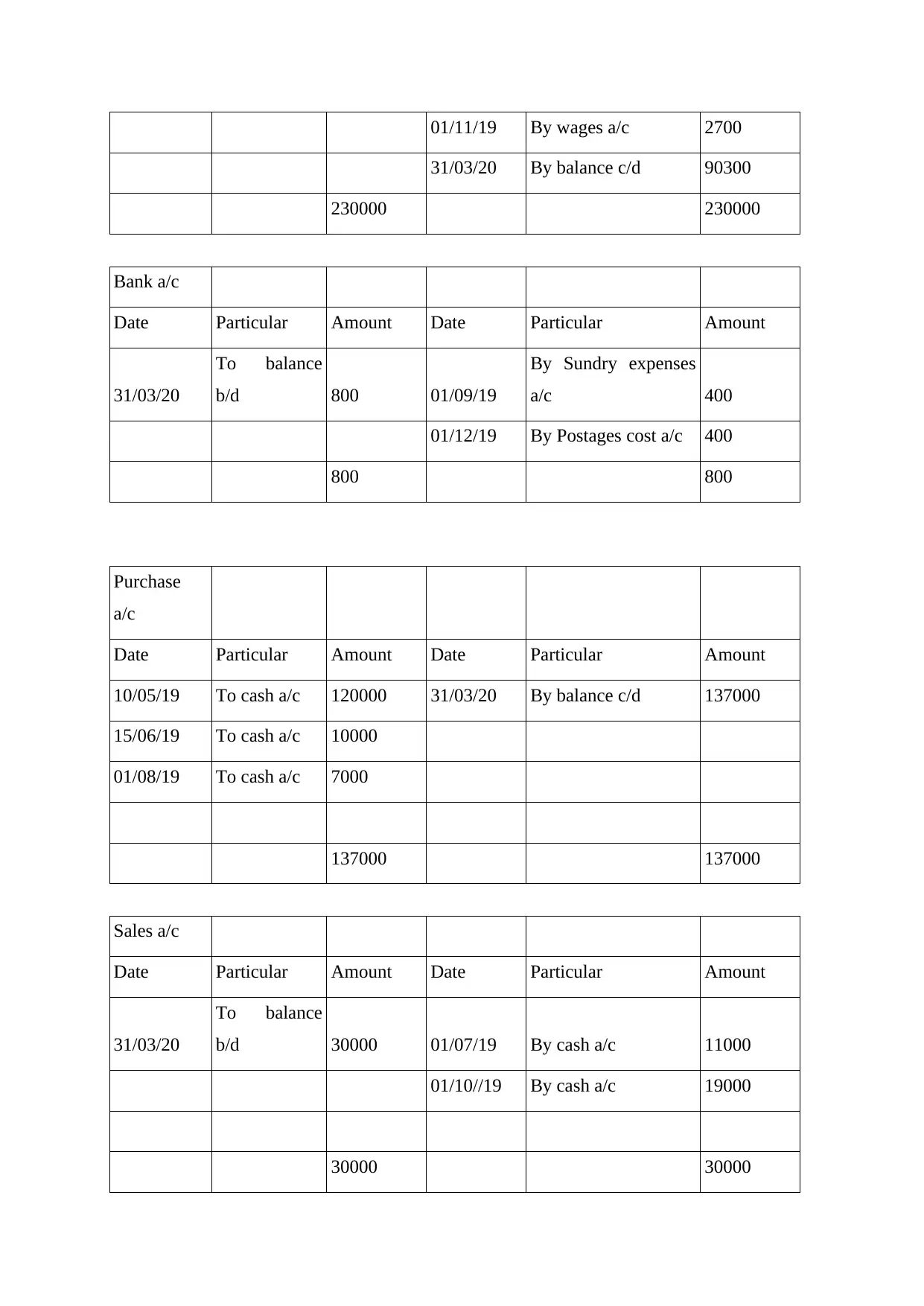
01/11/19 By wages a/c 2700
31/03/20 By balance c/d 90300
230000 230000
Bank a/c
Date Particular Amount Date Particular Amount
31/03/20
To balance
b/d 800 01/09/19
By Sundry expenses
a/c 400
01/12/19 By Postages cost a/c 400
800 800
Purchase
a/c
Date Particular Amount Date Particular Amount
10/05/19 To cash a/c 120000 31/03/20 By balance c/d 137000
15/06/19 To cash a/c 10000
01/08/19 To cash a/c 7000
137000 137000
Sales a/c
Date Particular Amount Date Particular Amount
31/03/20
To balance
b/d 30000 01/07/19 By cash a/c 11000
01/10//19 By cash a/c 19000
30000 30000
31/03/20 By balance c/d 90300
230000 230000
Bank a/c
Date Particular Amount Date Particular Amount
31/03/20
To balance
b/d 800 01/09/19
By Sundry expenses
a/c 400
01/12/19 By Postages cost a/c 400
800 800
Purchase
a/c
Date Particular Amount Date Particular Amount
10/05/19 To cash a/c 120000 31/03/20 By balance c/d 137000
15/06/19 To cash a/c 10000
01/08/19 To cash a/c 7000
137000 137000
Sales a/c
Date Particular Amount Date Particular Amount
31/03/20
To balance
b/d 30000 01/07/19 By cash a/c 11000
01/10//19 By cash a/c 19000
30000 30000
⊘ This is a preview!⊘
Do you want full access?
Subscribe today to unlock all pages.

Trusted by 1+ million students worldwide
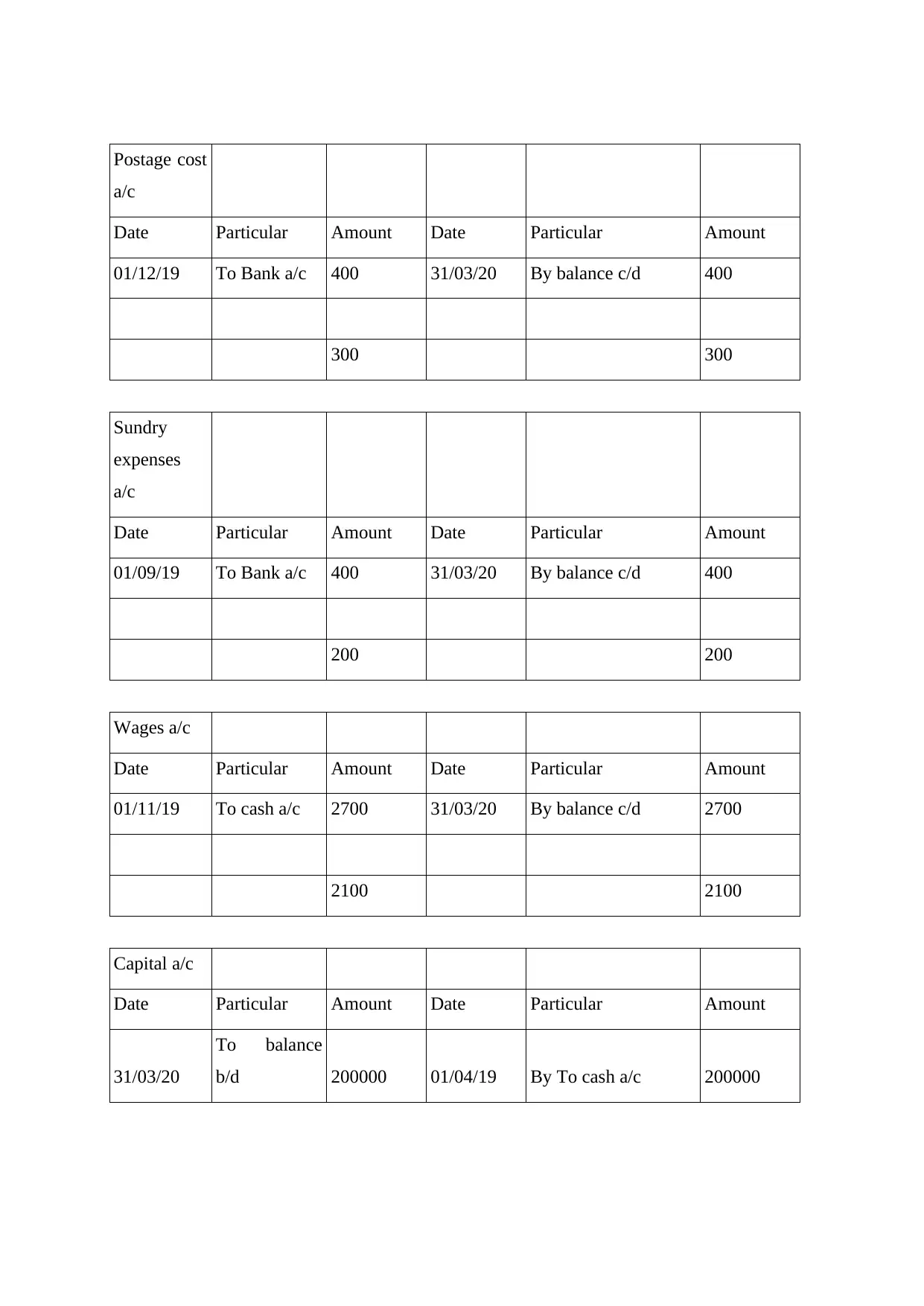
Postage cost
a/c
Date Particular Amount Date Particular Amount
01/12/19 To Bank a/c 400 31/03/20 By balance c/d 400
300 300
Sundry
expenses
a/c
Date Particular Amount Date Particular Amount
01/09/19 To Bank a/c 400 31/03/20 By balance c/d 400
200 200
Wages a/c
Date Particular Amount Date Particular Amount
01/11/19 To cash a/c 2700 31/03/20 By balance c/d 2700
2100 2100
Capital a/c
Date Particular Amount Date Particular Amount
31/03/20
To balance
b/d 200000 01/04/19 By To cash a/c 200000
a/c
Date Particular Amount Date Particular Amount
01/12/19 To Bank a/c 400 31/03/20 By balance c/d 400
300 300
Sundry
expenses
a/c
Date Particular Amount Date Particular Amount
01/09/19 To Bank a/c 400 31/03/20 By balance c/d 400
200 200
Wages a/c
Date Particular Amount Date Particular Amount
01/11/19 To cash a/c 2700 31/03/20 By balance c/d 2700
2100 2100
Capital a/c
Date Particular Amount Date Particular Amount
31/03/20
To balance
b/d 200000 01/04/19 By To cash a/c 200000
Paraphrase This Document
Need a fresh take? Get an instant paraphrase of this document with our AI Paraphraser
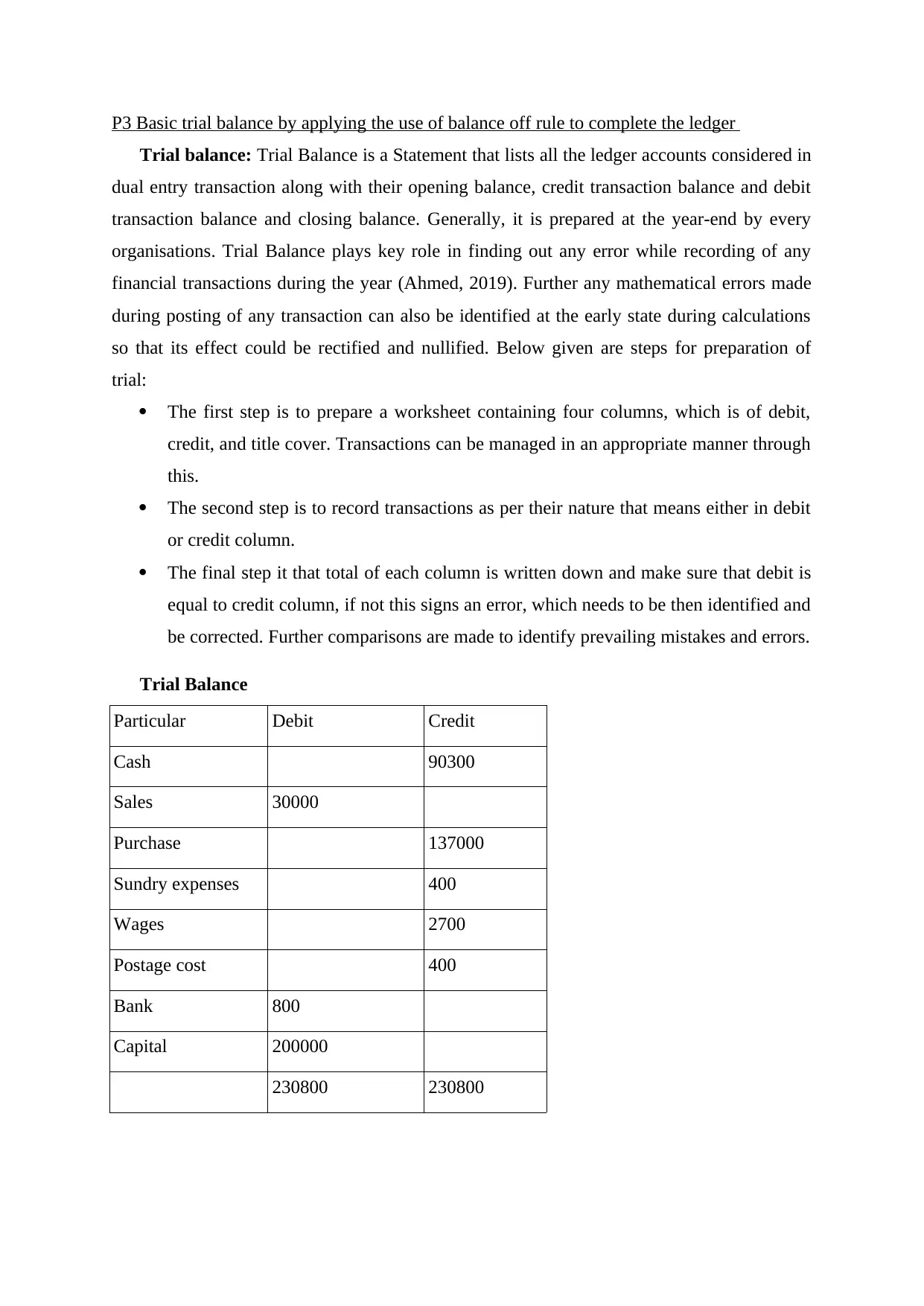
P3 Basic trial balance by applying the use of balance off rule to complete the ledger
Trial balance: Trial Balance is a Statement that lists all the ledger accounts considered in
dual entry transaction along with their opening balance, credit transaction balance and debit
transaction balance and closing balance. Generally, it is prepared at the year-end by every
organisations. Trial Balance plays key role in finding out any error while recording of any
financial transactions during the year (Ahmed, 2019). Further any mathematical errors made
during posting of any transaction can also be identified at the early state during calculations
so that its effect could be rectified and nullified. Below given are steps for preparation of
trial:
The first step is to prepare a worksheet containing four columns, which is of debit,
credit, and title cover. Transactions can be managed in an appropriate manner through
this.
The second step is to record transactions as per their nature that means either in debit
or credit column.
The final step it that total of each column is written down and make sure that debit is
equal to credit column, if not this signs an error, which needs to be then identified and
be corrected. Further comparisons are made to identify prevailing mistakes and errors.
Trial Balance
Particular Debit Credit
Cash 90300
Sales 30000
Purchase 137000
Sundry expenses 400
Wages 2700
Postage cost 400
Bank 800
Capital 200000
230800 230800
Trial balance: Trial Balance is a Statement that lists all the ledger accounts considered in
dual entry transaction along with their opening balance, credit transaction balance and debit
transaction balance and closing balance. Generally, it is prepared at the year-end by every
organisations. Trial Balance plays key role in finding out any error while recording of any
financial transactions during the year (Ahmed, 2019). Further any mathematical errors made
during posting of any transaction can also be identified at the early state during calculations
so that its effect could be rectified and nullified. Below given are steps for preparation of
trial:
The first step is to prepare a worksheet containing four columns, which is of debit,
credit, and title cover. Transactions can be managed in an appropriate manner through
this.
The second step is to record transactions as per their nature that means either in debit
or credit column.
The final step it that total of each column is written down and make sure that debit is
equal to credit column, if not this signs an error, which needs to be then identified and
be corrected. Further comparisons are made to identify prevailing mistakes and errors.
Trial Balance
Particular Debit Credit
Cash 90300
Sales 30000
Purchase 137000
Sundry expenses 400
Wages 2700
Postage cost 400
Bank 800
Capital 200000
230800 230800
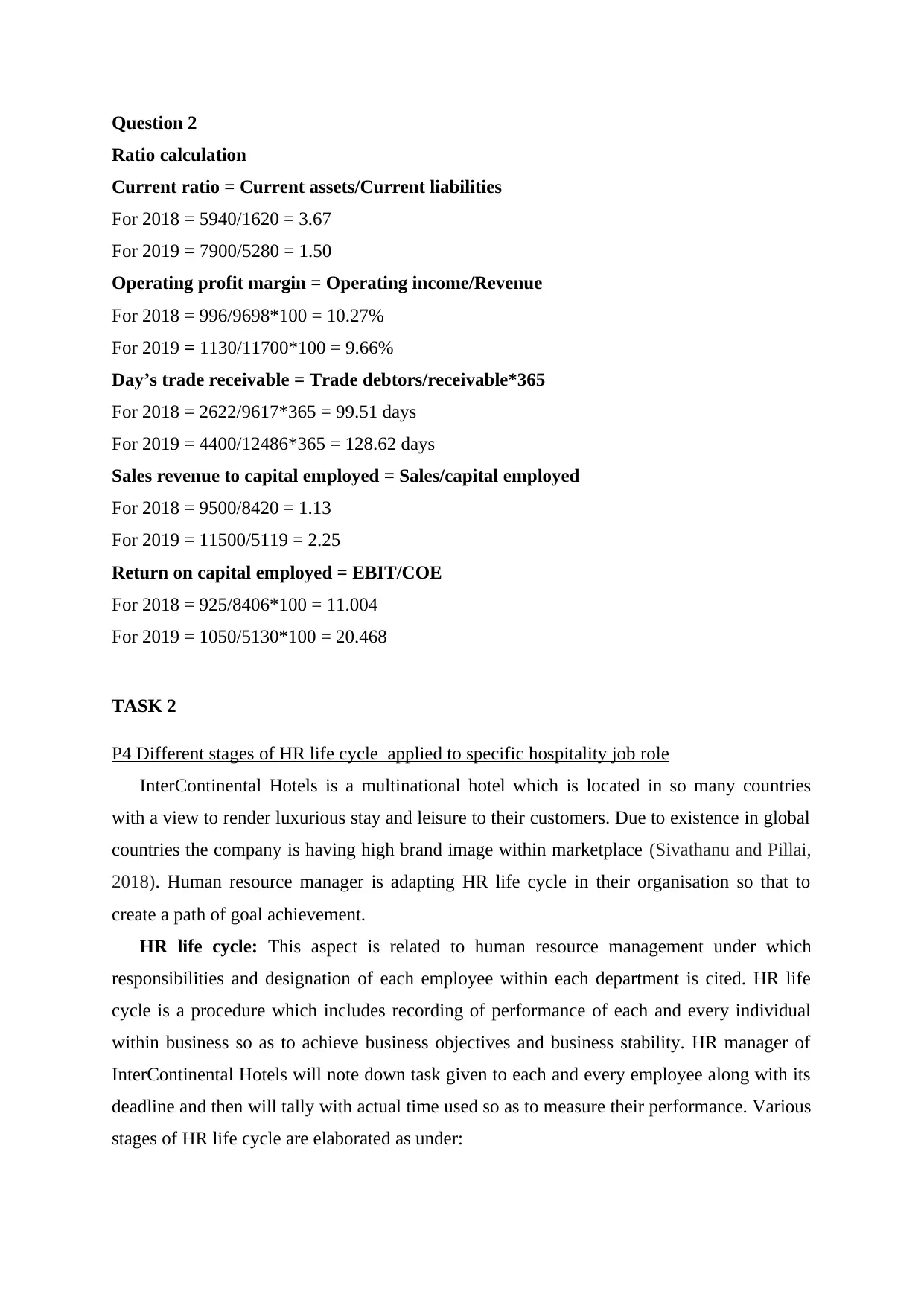
Question 2
Ratio calculation
Current ratio = Current assets/Current liabilities
For 2018 = 5940/1620 = 3.67
For 2019 = 7900/5280 = 1.50
Operating profit margin = Operating income/Revenue
For 2018 = 996/9698*100 = 10.27%
For 2019 = 1130/11700*100 = 9.66%
Day’s trade receivable = Trade debtors/receivable*365
For 2018 = 2622/9617*365 = 99.51 days
For 2019 = 4400/12486*365 = 128.62 days
Sales revenue to capital employed = Sales/capital employed
For 2018 = 9500/8420 = 1.13
For 2019 = 11500/5119 = 2.25
Return on capital employed = EBIT/COE
For 2018 = 925/8406*100 = 11.004
For 2019 = 1050/5130*100 = 20.468
TASK 2
P4 Different stages of HR life cycle applied to specific hospitality job role
InterContinental Hotels is a multinational hotel which is located in so many countries
with a view to render luxurious stay and leisure to their customers. Due to existence in global
countries the company is having high brand image within marketplace (Sivathanu and Pillai,
2018). Human resource manager is adapting HR life cycle in their organisation so that to
create a path of goal achievement.
HR life cycle: This aspect is related to human resource management under which
responsibilities and designation of each employee within each department is cited. HR life
cycle is a procedure which includes recording of performance of each and every individual
within business so as to achieve business objectives and business stability. HR manager of
InterContinental Hotels will note down task given to each and every employee along with its
deadline and then will tally with actual time used so as to measure their performance. Various
stages of HR life cycle are elaborated as under:
Ratio calculation
Current ratio = Current assets/Current liabilities
For 2018 = 5940/1620 = 3.67
For 2019 = 7900/5280 = 1.50
Operating profit margin = Operating income/Revenue
For 2018 = 996/9698*100 = 10.27%
For 2019 = 1130/11700*100 = 9.66%
Day’s trade receivable = Trade debtors/receivable*365
For 2018 = 2622/9617*365 = 99.51 days
For 2019 = 4400/12486*365 = 128.62 days
Sales revenue to capital employed = Sales/capital employed
For 2018 = 9500/8420 = 1.13
For 2019 = 11500/5119 = 2.25
Return on capital employed = EBIT/COE
For 2018 = 925/8406*100 = 11.004
For 2019 = 1050/5130*100 = 20.468
TASK 2
P4 Different stages of HR life cycle applied to specific hospitality job role
InterContinental Hotels is a multinational hotel which is located in so many countries
with a view to render luxurious stay and leisure to their customers. Due to existence in global
countries the company is having high brand image within marketplace (Sivathanu and Pillai,
2018). Human resource manager is adapting HR life cycle in their organisation so that to
create a path of goal achievement.
HR life cycle: This aspect is related to human resource management under which
responsibilities and designation of each employee within each department is cited. HR life
cycle is a procedure which includes recording of performance of each and every individual
within business so as to achieve business objectives and business stability. HR manager of
InterContinental Hotels will note down task given to each and every employee along with its
deadline and then will tally with actual time used so as to measure their performance. Various
stages of HR life cycle are elaborated as under:
⊘ This is a preview!⊘
Do you want full access?
Subscribe today to unlock all pages.

Trusted by 1+ million students worldwide
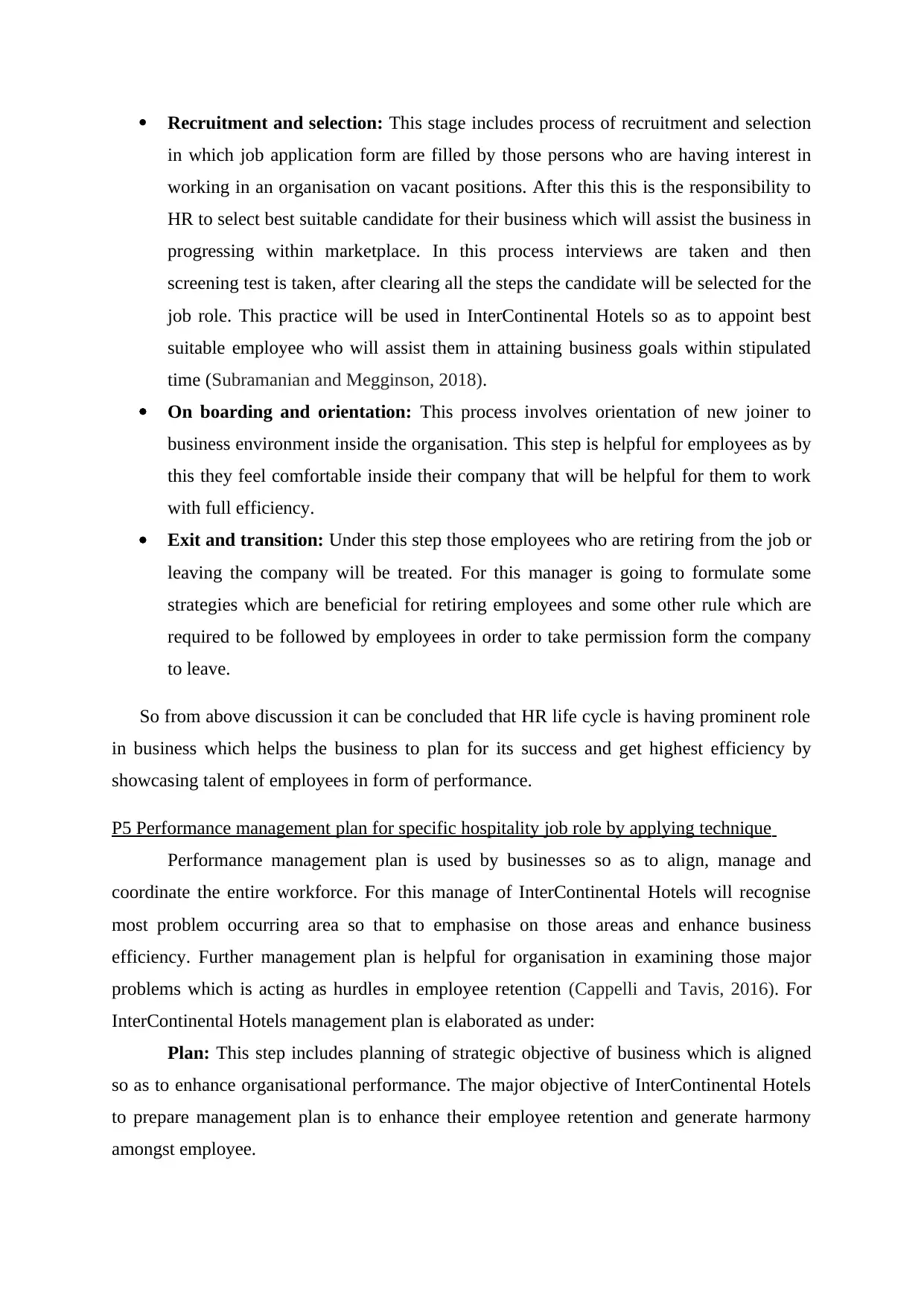
Recruitment and selection: This stage includes process of recruitment and selection
in which job application form are filled by those persons who are having interest in
working in an organisation on vacant positions. After this this is the responsibility to
HR to select best suitable candidate for their business which will assist the business in
progressing within marketplace. In this process interviews are taken and then
screening test is taken, after clearing all the steps the candidate will be selected for the
job role. This practice will be used in InterContinental Hotels so as to appoint best
suitable employee who will assist them in attaining business goals within stipulated
time (Subramanian and Megginson, 2018).
On boarding and orientation: This process involves orientation of new joiner to
business environment inside the organisation. This step is helpful for employees as by
this they feel comfortable inside their company that will be helpful for them to work
with full efficiency.
Exit and transition: Under this step those employees who are retiring from the job or
leaving the company will be treated. For this manager is going to formulate some
strategies which are beneficial for retiring employees and some other rule which are
required to be followed by employees in order to take permission form the company
to leave.
So from above discussion it can be concluded that HR life cycle is having prominent role
in business which helps the business to plan for its success and get highest efficiency by
showcasing talent of employees in form of performance.
P5 Performance management plan for specific hospitality job role by applying technique
Performance management plan is used by businesses so as to align, manage and
coordinate the entire workforce. For this manage of InterContinental Hotels will recognise
most problem occurring area so that to emphasise on those areas and enhance business
efficiency. Further management plan is helpful for organisation in examining those major
problems which is acting as hurdles in employee retention (Cappelli and Tavis, 2016). For
InterContinental Hotels management plan is elaborated as under:
Plan: This step includes planning of strategic objective of business which is aligned
so as to enhance organisational performance. The major objective of InterContinental Hotels
to prepare management plan is to enhance their employee retention and generate harmony
amongst employee.
in which job application form are filled by those persons who are having interest in
working in an organisation on vacant positions. After this this is the responsibility to
HR to select best suitable candidate for their business which will assist the business in
progressing within marketplace. In this process interviews are taken and then
screening test is taken, after clearing all the steps the candidate will be selected for the
job role. This practice will be used in InterContinental Hotels so as to appoint best
suitable employee who will assist them in attaining business goals within stipulated
time (Subramanian and Megginson, 2018).
On boarding and orientation: This process involves orientation of new joiner to
business environment inside the organisation. This step is helpful for employees as by
this they feel comfortable inside their company that will be helpful for them to work
with full efficiency.
Exit and transition: Under this step those employees who are retiring from the job or
leaving the company will be treated. For this manager is going to formulate some
strategies which are beneficial for retiring employees and some other rule which are
required to be followed by employees in order to take permission form the company
to leave.
So from above discussion it can be concluded that HR life cycle is having prominent role
in business which helps the business to plan for its success and get highest efficiency by
showcasing talent of employees in form of performance.
P5 Performance management plan for specific hospitality job role by applying technique
Performance management plan is used by businesses so as to align, manage and
coordinate the entire workforce. For this manage of InterContinental Hotels will recognise
most problem occurring area so that to emphasise on those areas and enhance business
efficiency. Further management plan is helpful for organisation in examining those major
problems which is acting as hurdles in employee retention (Cappelli and Tavis, 2016). For
InterContinental Hotels management plan is elaborated as under:
Plan: This step includes planning of strategic objective of business which is aligned
so as to enhance organisational performance. The major objective of InterContinental Hotels
to prepare management plan is to enhance their employee retention and generate harmony
amongst employee.
Paraphrase This Document
Need a fresh take? Get an instant paraphrase of this document with our AI Paraphraser
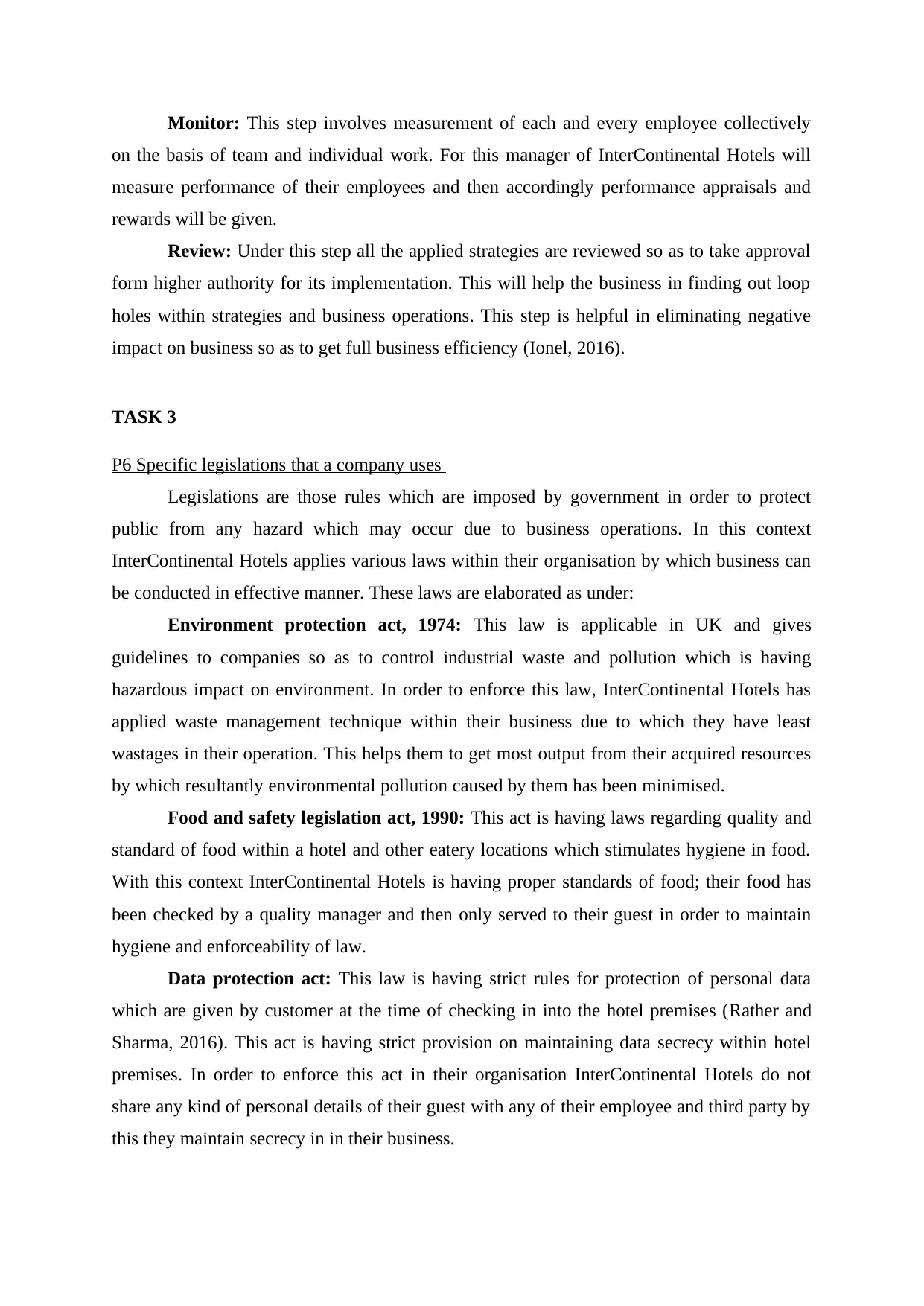
Monitor: This step involves measurement of each and every employee collectively
on the basis of team and individual work. For this manager of InterContinental Hotels will
measure performance of their employees and then accordingly performance appraisals and
rewards will be given.
Review: Under this step all the applied strategies are reviewed so as to take approval
form higher authority for its implementation. This will help the business in finding out loop
holes within strategies and business operations. This step is helpful in eliminating negative
impact on business so as to get full business efficiency (Ionel, 2016).
TASK 3
P6 Specific legislations that a company uses
Legislations are those rules which are imposed by government in order to protect
public from any hazard which may occur due to business operations. In this context
InterContinental Hotels applies various laws within their organisation by which business can
be conducted in effective manner. These laws are elaborated as under:
Environment protection act, 1974: This law is applicable in UK and gives
guidelines to companies so as to control industrial waste and pollution which is having
hazardous impact on environment. In order to enforce this law, InterContinental Hotels has
applied waste management technique within their business due to which they have least
wastages in their operation. This helps them to get most output from their acquired resources
by which resultantly environmental pollution caused by them has been minimised.
Food and safety legislation act, 1990: This act is having laws regarding quality and
standard of food within a hotel and other eatery locations which stimulates hygiene in food.
With this context InterContinental Hotels is having proper standards of food; their food has
been checked by a quality manager and then only served to their guest in order to maintain
hygiene and enforceability of law.
Data protection act: This law is having strict rules for protection of personal data
which are given by customer at the time of checking in into the hotel premises (Rather and
Sharma, 2016). This act is having strict provision on maintaining data secrecy within hotel
premises. In order to enforce this act in their organisation InterContinental Hotels do not
share any kind of personal details of their guest with any of their employee and third party by
this they maintain secrecy in in their business.
on the basis of team and individual work. For this manager of InterContinental Hotels will
measure performance of their employees and then accordingly performance appraisals and
rewards will be given.
Review: Under this step all the applied strategies are reviewed so as to take approval
form higher authority for its implementation. This will help the business in finding out loop
holes within strategies and business operations. This step is helpful in eliminating negative
impact on business so as to get full business efficiency (Ionel, 2016).
TASK 3
P6 Specific legislations that a company uses
Legislations are those rules which are imposed by government in order to protect
public from any hazard which may occur due to business operations. In this context
InterContinental Hotels applies various laws within their organisation by which business can
be conducted in effective manner. These laws are elaborated as under:
Environment protection act, 1974: This law is applicable in UK and gives
guidelines to companies so as to control industrial waste and pollution which is having
hazardous impact on environment. In order to enforce this law, InterContinental Hotels has
applied waste management technique within their business due to which they have least
wastages in their operation. This helps them to get most output from their acquired resources
by which resultantly environmental pollution caused by them has been minimised.
Food and safety legislation act, 1990: This act is having laws regarding quality and
standard of food within a hotel and other eatery locations which stimulates hygiene in food.
With this context InterContinental Hotels is having proper standards of food; their food has
been checked by a quality manager and then only served to their guest in order to maintain
hygiene and enforceability of law.
Data protection act: This law is having strict rules for protection of personal data
which are given by customer at the time of checking in into the hotel premises (Rather and
Sharma, 2016). This act is having strict provision on maintaining data secrecy within hotel
premises. In order to enforce this act in their organisation InterContinental Hotels do not
share any kind of personal details of their guest with any of their employee and third party by
this they maintain secrecy in in their business.
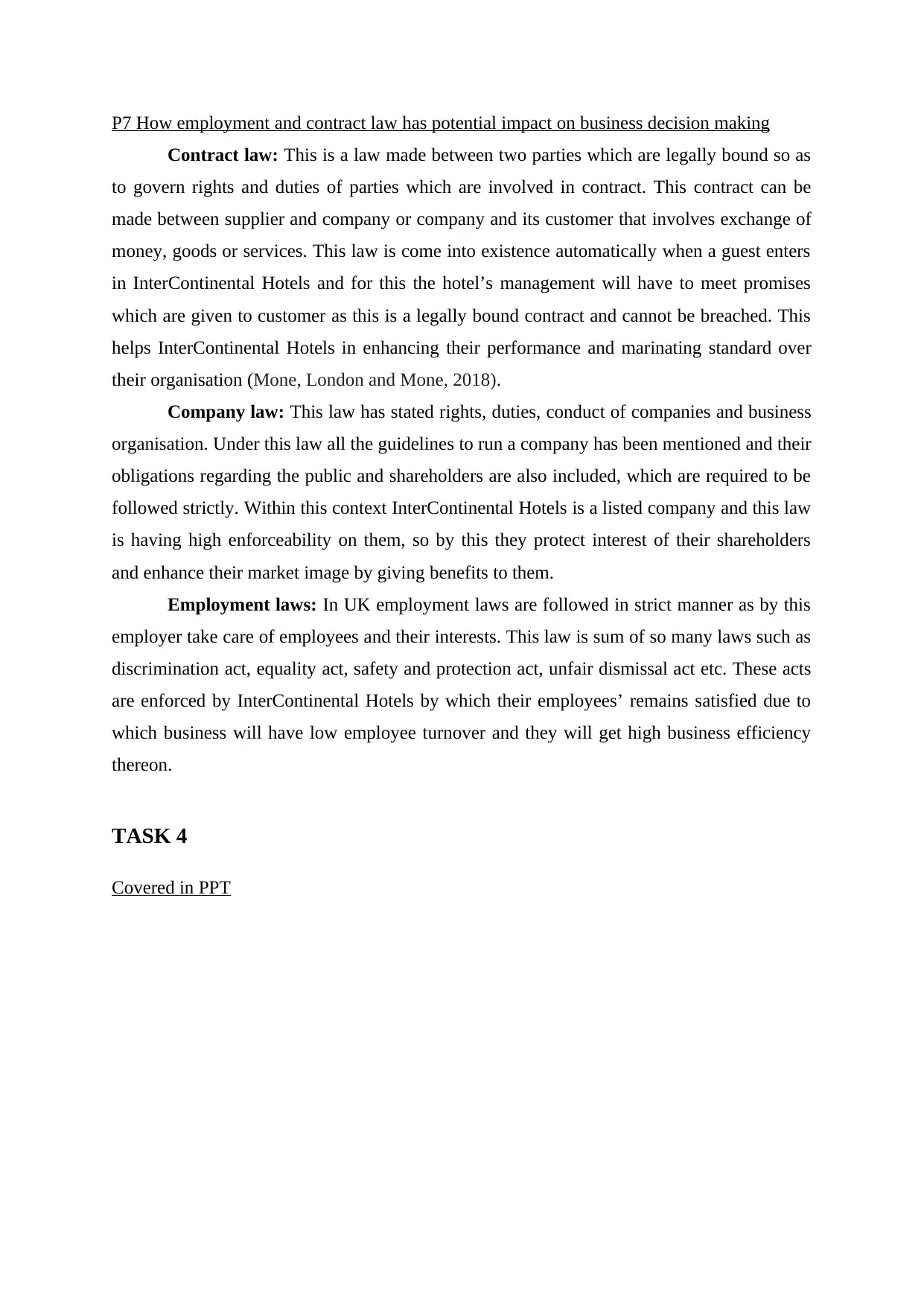
P7 How employment and contract law has potential impact on business decision making
Contract law: This is a law made between two parties which are legally bound so as
to govern rights and duties of parties which are involved in contract. This contract can be
made between supplier and company or company and its customer that involves exchange of
money, goods or services. This law is come into existence automatically when a guest enters
in InterContinental Hotels and for this the hotel’s management will have to meet promises
which are given to customer as this is a legally bound contract and cannot be breached. This
helps InterContinental Hotels in enhancing their performance and marinating standard over
their organisation (Mone, London and Mone, 2018).
Company law: This law has stated rights, duties, conduct of companies and business
organisation. Under this law all the guidelines to run a company has been mentioned and their
obligations regarding the public and shareholders are also included, which are required to be
followed strictly. Within this context InterContinental Hotels is a listed company and this law
is having high enforceability on them, so by this they protect interest of their shareholders
and enhance their market image by giving benefits to them.
Employment laws: In UK employment laws are followed in strict manner as by this
employer take care of employees and their interests. This law is sum of so many laws such as
discrimination act, equality act, safety and protection act, unfair dismissal act etc. These acts
are enforced by InterContinental Hotels by which their employees’ remains satisfied due to
which business will have low employee turnover and they will get high business efficiency
thereon.
TASK 4
Covered in PPT
Contract law: This is a law made between two parties which are legally bound so as
to govern rights and duties of parties which are involved in contract. This contract can be
made between supplier and company or company and its customer that involves exchange of
money, goods or services. This law is come into existence automatically when a guest enters
in InterContinental Hotels and for this the hotel’s management will have to meet promises
which are given to customer as this is a legally bound contract and cannot be breached. This
helps InterContinental Hotels in enhancing their performance and marinating standard over
their organisation (Mone, London and Mone, 2018).
Company law: This law has stated rights, duties, conduct of companies and business
organisation. Under this law all the guidelines to run a company has been mentioned and their
obligations regarding the public and shareholders are also included, which are required to be
followed strictly. Within this context InterContinental Hotels is a listed company and this law
is having high enforceability on them, so by this they protect interest of their shareholders
and enhance their market image by giving benefits to them.
Employment laws: In UK employment laws are followed in strict manner as by this
employer take care of employees and their interests. This law is sum of so many laws such as
discrimination act, equality act, safety and protection act, unfair dismissal act etc. These acts
are enforced by InterContinental Hotels by which their employees’ remains satisfied due to
which business will have low employee turnover and they will get high business efficiency
thereon.
TASK 4
Covered in PPT
⊘ This is a preview!⊘
Do you want full access?
Subscribe today to unlock all pages.

Trusted by 1+ million students worldwide
1 out of 14
Related Documents
Your All-in-One AI-Powered Toolkit for Academic Success.
+13062052269
info@desklib.com
Available 24*7 on WhatsApp / Email
![[object Object]](/_next/static/media/star-bottom.7253800d.svg)
Unlock your academic potential
Copyright © 2020–2026 A2Z Services. All Rights Reserved. Developed and managed by ZUCOL.




